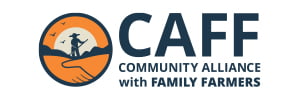The Sonoma County Chapter of Community Alliance with Family Farmers (CAFF) is OPPOSED to the proposed local ballot measure put forth by the Coalition to End Factory Farming to prohibit the operation of those local farms asserted as Concentrated Animal Feeding Operations (CAFOs).
This misguided measure proposes a local ordinance that would prohibit the operation of CAFOs in Sonoma County. It targets dairies and poultry farms; it excludes horses, goats, and sheep. It mandates that any farming operation that qualifies as a CAFO be shuttered within a 3-year phase-out period.
The Coalition has attempted to single out dairies and poultry operations in Sonoma County that they believe qualify as CAFOs. Although the determination of which operations legally qualify as CAFOs will not be possible unless the ordinance is approved and the Sonoma County Agricultural Commissioner’s Office exercises its permitting authority, the targeted farms would likely be severely impacted—whether by being mandated to close or by legal fees to determine their status.
If passed, the ordinance could result in the elimination of the vast amount of locally-produced dairy, poultry, and eggs, which currently supply our region and much of the state. However, the ordinance would not prevent the importation of dairy and poultry products from outside of Sonoma County. Instead of products raised locally, products would be shipped in from large CAFOs from across the state, country, and even world. There would be no assurance of improvement in animal welfare for products sold in Sonoma County.
About CAFF: Since 1978, our nonprofit organization has advocated for small-scale family farms, healthy local food systems, and regenerative agriculture. Learn more about us at www.caff.org

ENVIRONMENTAL BENEFITS AND ANIMAL WELFARE
- Local dairies have received numerous awards and recognition for their environmental practices, including the Leopold Conservation Award, the Real Leaders Eco Innovation Award, and innovative “carbon neutral” efforts.
- 85% of Sonoma County dairies are certified organic, as well as 11 of the county’s poultry operations– including one that raised the first ever, third party-certified organic chicken to be on the market in 1999. Organic certification requires that farming operations give their animals “access to the outdoors, shade, shelter, exercise areas, fresh air, clean water for drinking, and direct sunlight.” In addition, it prohibits the use of chemicals harmful to the environment. The recent USDA Strengthening Organic Enforcement rule, effective as of 2024, will further ensure that these standards are enforced throughout the supply chain.
- 100% of dairy operations in our region graze their cattle on high-quality pasture. Well-managed grazing promotes open space preservation, soil carbon capture, groundwater recharge, and biodiversity conservation.
- Most of the year, dairy cows move freely between the barn and pasture. During the inclement weather of winter months, cows prefer to be inside a barn. The only time they are not allowed to freely move outside is when the ground is too wet and soft. This is both for their well-being and the preservation of the pasture.
- If this measure passes, the agricultural usage of thousands of acres of pasture could be lost and potentially converted to development.
- Abandoning grazing would lead to an increase in invasive weeds. Grazing lands have been designated as such due to their ecological history, having co-evolved with ruminants. Our county’s pasturelands have been designated most appropriate for grazing.
- Prohibiting animal operations larger than a certain size locally will result in food businesses and distributors shipping in food products from CAFOs from outside Sonoma County– including products shipped across the country or the globe. The ordinance does not mandate any animal welfare requirements of the products shipped in. The additional trucking and shipping required to replace locally-produced food with imported products will increase greenhouse gas emissions.

NUTRITIONAL QUALITY
- Many of our locally-produced products provide consumers with options for fresh, nutrient-dense, certified organic food – free of pesticides, hormones and antibiotics.
FOOD SUPPLY AND SECURITY
- By potentially eliminating these locally-produced food products, our local food security will become more vulnerable to supply chain disruptions such as natural disasters, pandemics and global political unrest.
- Limiting production to small-scale producers would make most local dairy and poultry products unaffordable to those with limited incomes.

ECONOMY
- Dollars spent on local dairy, poultry, and eggs will be diverted from local farm businesses to distant corporations and large-scale farms, with products trucked in to replace those raised locally.
- There would be significant negative impacts to our local economy, including job loss as well as impacts to local businesses such as restaurants, caterers, and agricultural suppliers. In addition, our local tourism industry promotes our outstanding food culture as making Sonoma County a prime tourism destination, so this substantial industry would be harmed as well. These impacts would multiply throughout our economy with serious consequences.
- Many local brands and products have a loyal consumer base. People value their quality, freshness, and flavor.
CAFF is committed to building a more resilient food system, which includes prioritizing animal welfare and promoting ecological farming practices. We advocate for incentives and technical support for producers to adopt practices that benefit the farm ecosystem, community health and well-being, and farmers’ economic viability. We also promote local producers who utilize and exemplify ecological farming practices, including pastured livestock, and encourage consumers to support them by purchasing their products.
This proposal would be detrimental to our robust local food system and could endanger the productive use of thousands of acres of grasslands that our producers have protected and nurtured for generations. Sonoma County has a rich agricultural heritage rooted in our fertile soil, benign climate and other natural resources, and consumers should be able to choose locally-produced food – whether purchased in the supermarket, farmers market, or directly from producers.
Please join us in voting NO on this measure.
Message Endorsed by:



